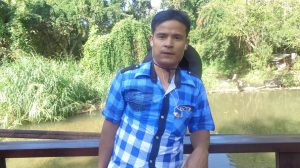
Remote Ban Mae Surin camp offers few opportunities for residents to improve their livelihoods.
But the river running through the camp in Mae Hong Son province is a vital natural food resource for the community, and camp leaders are working to ensure it remains that way.
An exposure trip to a nearby Thai river-side village where fish appeared to be plentiful gave Saya Wah Paw Shar the idea that Ban Mae Surin could enjoy a similar benefit.
He talked to the Thai village head and villagers to “get some ideas,’’ and soon after, the Ban Mae Surin camp committee began work to set up a fish sanctuary, with support from a TBC Food and Livelihoods officer. The local Thai fisheries department contributed thousands of fish stock.
At first, some members of the community did not understand the plan, said Saya Wah Paw Shar, Secretary 1 of the camp committee and leader of the livelihoods committee. “People continued to fish in the sanctuary area,’’ he said.
“However, we set up regulations on where it was permitted to fish. And I asked the Thai village head to come and share more information, explain the benefits of the project and encourage community cooperation.’’
TBC’s community-driven natural resources management (CDNRM) programme focuses on the use and care of natural resources in and around the camps. Initiatives have included promoting sustainable building practices, bamboo harvesting, and hydro-power.
The programme’s activities have helped to foster cooperation on natural resources management around the camps between refugees, local Thai authorities, the Royal Thai Forestry Department, local Thai villages and community-based organisations.


